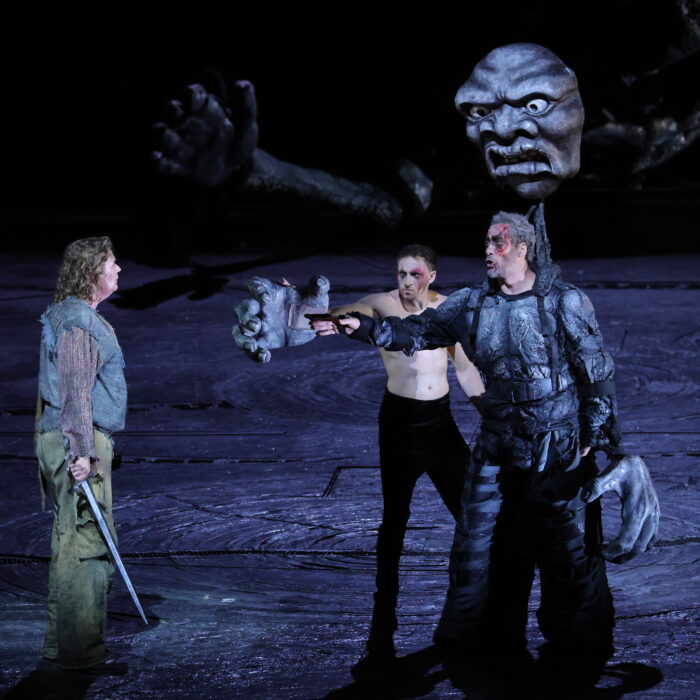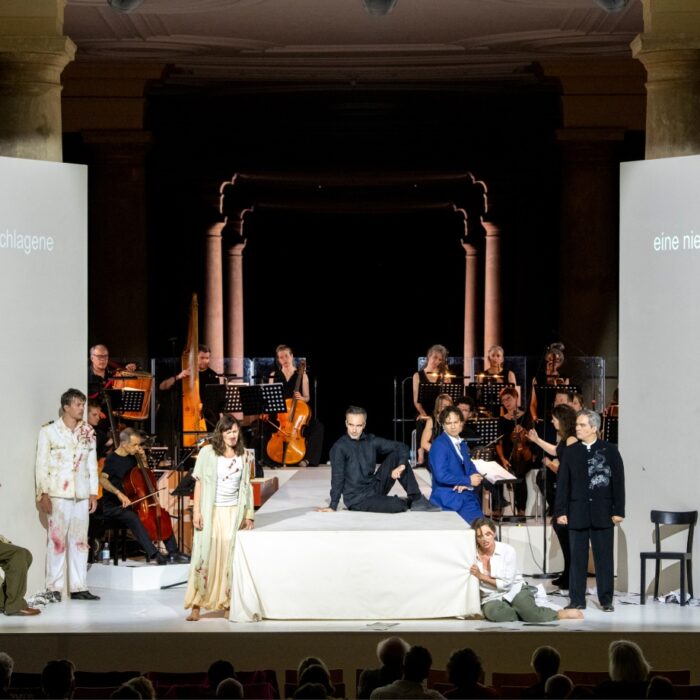
Munich Opera Festival 2024 Review: Die Passagieren
By Lois Silverstein(Credit: W.Hoesl)
It was particularly notable to watch Mieczyslaw Weinberg’s opera, “Die Passagieren” in Munich, even all these years after World War II. To walk the same streets where once goose-stepping Nazi soldiers rallied round Hitler and to visit the elegant, rebuilt National Theater to see an opera about the tragedy of that very subject intensified the experience.
“Die Passagieren” is based on the autobiographical novel “Pasazerka” by Zofia Posmysz, 1923-2022, which was also turned into a film. The opera was composed in 1968, but it was not performed until a concert version had its world premiere in 2006. The opera with its libretto composed by Alexander W. Medvedev, was sung in German, with other languages, including Polish, were spliced in at relevant points. The opera’s plot involves two time periods: a transatlantic crossing around 1958-1960 to Brazil, and flashbacks to Auschwitz concentration camp in 1943.
The Munich production by Tobias Kratzer with set design by Rainer Sellmaier brought us directly in contact with the moral and psychological issues that it concerned. Three rows of five ships’ cabins on a ship en route to Brazil in the 1960’s faced the audience. In each cabin/balcony was another version of people attempting to leave behind the world of death and destruction, and its scars. Each of these people were attempting to forget and start a new life. We saw people doing yoga; former camp guards complaining of the difficulties of destroying 20,000 bodies a day; one couple trying for a second honeymoon. However, Annaliese Frantz, AKA Lisa, the main protagonist, cannot leave her previous life behind, despite the urging of her diplomat husband, Walter. She was a former SS Camp Guard who believes she sees one of the inmates that she knew back then. Marta. Was she still alive? Oceanic projections heightened the interior and exterior levels of these events, accenting the universality and the history of the war, and thus intensifying the drama between and within individual characters.
Act one focused on the particular encounter between Lisa and Marta, the former camp inmate. Mezzo-soprano Sophie Koch as Lisa, blended the multiple complexities of the character in both voice and acting with great skill. She sang with a wide range of power – from apologia to denial to defense to self-hatred and sadistic violence.
However, when Lisa told her husband that she was a concentration camp guard during the war, and claimed that she was not responsible for the consequences of her actions, it occurred without sufficient preparation. Those were her orders, she blurted out, and she was just following them. This revelation was highly important, but it seemed like an outburst rather than a carefully developed expression. At first it was hidden and highly private; her husband of fifteen years knew nothing about it. Then, suddenly, there it was, public. Walter, her husband, sung poignantly by Charles Workman, then quickly switched from an erotically charged husband to an anxious and condemnatory one. But rather than a person simply taking the moral high ground, his judgment arose from his fear of besmirching his diplomatic reputation.
Lisa persisted with her self-justification in all these moments with Walter, but by the time she whipped around the banquet table in Act two with the violin bow that belonged to old Marta’s husband Tadeusz, any attempt at self-justification vanished. Self-recognition grew as she threw herself around the long banquet tables; she became emboldened as she expressed her violent feelings and desire to dominate the prisoners under her control. Not a trace of the mewling banality that appeared at the outset remained. Only the creeping presence of old Lisa carrying the urn of her dead husband counterpointed this powerful orgiastic action.
Old Lisa was silently performed by Sibylle Maria Dordel. In every scene she appeared and dominated in her silence and suffering, suffusing all talk and attempted ordinary actions as victim-protagonist and silent witness. Like Hamlet’s father’s ghost did in Shakespeare’s masterpiece, her presence hovered over us as we watched and continued to grow in our realization of all who had been trampled and destroyed. She remained larger than life throughout the opera, larger even than memory. While Lisa confronted her own action beside and before her, she came up feeble by contrast. The small body of this lost soul, running from cabin to cabin to deck, then from life into the water drowning with husband – ashes in the urn in her arms – we accepted there was no escape for her, for Lisa, or any of us, and permanently. The line, “When your voices disappear, then we will perish,” only began to make the point.
Act two included other aspects of war-time violence complete with young Marta, sung with exceptional beauty and terror by Elena Tsallagova . Her voice reached far into the house and illuminated not only its core beauty, but raised the question of what kind of redemption, if any, could there be for what happened. This resonated throughout the rest of the Act, punctuated by a mad parade of victims running throughout the banquet tables in carnivalesque style.
In addition to Walter the husband, there was Marta’s husband, the violinist, Tadeusz, who was defiant in refusing to play what the commandant wanted to hear, and instead played Bach, signifying not only his own choice and his own individual freedom, but floated over the whole scene in the sheer beauty of the musical line, both moving and incisive.
So too, the presence of the small television set with black and white pictures of the camp suffering, added another dimension to the historicity and the human pain. The whole scene, more than a stage and an orchestra-full, kept us riveted and electrified.
The scene in which young Marta is tortured by Lisa chilled in its directness and deliberate attempts not to flinch. It was powerful to see and come close to what human beings endured at that time.
The music was beautiful and powerful throughout. Conducted by Vladimir Jurowski, the young new general music director of the Munich opera, who carved the emotional outlay throughout. Jagged and dynamic sound and rhythm ranged each scene. Syncopated and sharp dynamic contrasts interspersed with jazz rhythms and folk and familiar pop tunes. Allusions to Benjamin Britten’s “Peter Grimes” and motifs of folk elements were sprinkled in the orchestral texture, creating a pastiche of time, place and circumstance. Jurowski kept he angular story well-fixed and tight. Never on its own but always on its own, he kept the dense musical fabric from losing track of time, place and circumstance, what was going on and the suffering it created.
Additionally, it kept us aware of the significance of these actions. That remained remarkable; we were never able to forget for one minute. We felt what was happening and we remained conscious of what that feeling meant. The ship’s passengers might be trying to get away geographically from the past; the sounds as Jurowski led Weinberg’s score, kept us on the edge of our seats, as if he were insisting that must not happen. Always relevant, always seeking to heighten the danger, he kept the pitch just about to boil over as death drew near. How could we ever escape the sound of the broken heart? It resounded throughout the theater.
Who could forget? Who could put away any of this? This was the striking part of the performance of “Die Passagierin”. It unfolded not as a story. Rather, it was an enactment, and one that had to be told and retold, like any ritual. One time could not be all. Accruing meaning occurred by repetition and as such reliving, by deepening our awareness and responsibility. It stunned and continues to do so.


